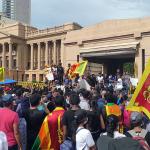Christianity is true. But it is not just head-knowledge, nor is it just heart-knowledge. Rather, “It is the cosmic narrative that is really unfolding, that we are really incorporated into, that really makes sense of everything else.”
So says Joshua Pauling, a Missouri Synod Lutheran, in a fascinating article for Modern Reformation entitled Christianity is More than True; It is Deepest Reality: Mysterion, Koinonia, and Kairos.
He writes,
Christianity tends to follow one of two trajectories today, both of which miss out on the deeper New Testament reality of life in Christ. For some it is mostly in their heads—a series of intellectual ideas to which they give mental assent. For others it is mostly in their hearts—a series of emotional experiences which give them the proper emotional feelings about God. But in neither form is Christianity a complete and compelling reality. It just seems to be another identity-category among many that make up one’s true self. It is not seen as reality, but an aspect of life one chooses to include, almost like a life accessory. This is far from the biblical picture and fails to inspire and sustain Christian fidelity in a fragmenting world. Recapturing Christianity’s enchantment with biblical concepts like mysterion, koinonia, and kairos might re-awaken us to the reality that the world is more than just a glob of material stuff; it is a cosmic dance.
He explores those three Biblical concepts that have been nearly forgotten today, but are important dimensions of a full Christian reality. You need to read what Pauling says about them, but here is a brief sampling and summary of what they entail.
Mysterion
The New Testament uses the word mysterion twenty-seven times, and it usually is in reference to the Gospel, the incarnation, or the sacramental mysteries of how God comes to man. The Greek root for mystery comes from “to shut the mouth” or “to cover one’s mouth.” As in awe—not mystery in the sense of unsolved crime or detective story, gnostic revelation or Eastern mysticism, but rather something that is so profound, so real, so deep, that all we can do is cover our mouths and be brought low before the mystery of God made man.
Koinonia
This word means “communion,” “fellowship,” “participation.” In the New Testament, it is used in reference both to the union that Christians have with each other in the Church and to the union they have with Christ through the sacrament of His body and blood. Thus,
Christians find their deepest identity around the Table of the Lord in a unified confession, and in communion—koinonia—with Christ himself and with those who also partake of the same body. Individual and communal identity find their nexus in the sacramental eating of Christ, which is a participation with Christ and his living body, the Church. By means of this real, mystical union with Christ, Christians are firmly planted in a sacramental culture, liturgical tradition, and embodied community.
Kairos
The New Testament has two words for time: chronos, meaning the sequence of linear time; and kairos, meaning the right time, the life-changing moments, “the fullness of time.” To use Pauling’s example, we can speak of the birth of a child in terms of its chronos, the date that it happened. Or as kairos, the moment of becoming a parent.
Today, Pauling notes, chronos dominates our thoughts, but throughout most of history–when people didn’t even have accurate ways of measuring “chronological” time–kairos was more important, as they organized their lives around the natural rhythms of the seasons, the holidays, and the milestones of life.
Christianity brings the two senses of time together. “Christians view all of the events of chronos time in relation to kairos time, which centers on Christ who came in the fullness of time—the kairos moment.” This carries over into the daily, weekly, and yearly life of the Christian:
This means that our life in Christ takes on a daily baptismal rhythm as we drown our sins and rise to new life. So too, life in Christ has a weekly eucharistic rhythm as we return to Word and Supper which all strengthen and confirm our union with Christ as deepest reality. A yearly redemptive rhythm also takes shape around Christ’s historical life, recounted in the celebration of the events surrounding Christmas, Easter, and in other feasts and holy days. Sacred time overshadows secular time, as our routines are punctuated and interrupted with the deeper reality of God’s action in space and time through Christ’s ministry, the history of salvation, and the history of the church as recounted in the church calendar. Together all of this forms a lifelong sacred rhythm, that frames the passage of life as structured by the church and marked by the milestones of God’s work in Word and Sacrament. We live by sacred time, not secular time, not sporting time, not work time, not school time.
Pauling argues that recovering mysterion, koinonia, and kairos is important, both to revitalize contemporary Christianity and to our apologetic and evangelistic outreach to those outside the church, including the”spiritual but not religious” who are searching for transcendence in all the wrong places and the burnt-out casualties of shallow and legalistic churches.
Illustration: Altarpiece, Church of Torslunde, Denmark (1561), Public domain, via Wikimedia Commons














